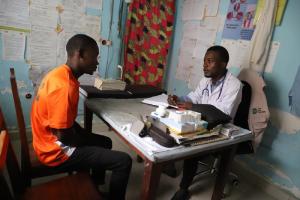Health committees mobilized to achieve universal health coverage in Congo
Brazzaville – “Previously, I avoided going to the integrated health centre (IHC) due to the high cost of care and poor reception," says Christine, 58, who lives in Nzalangoye, in Ouesso District in northern Congo.
In 2021, only 13.82% of the Congolese population had access to health services. Barriers such as lack of information, high cost of services, insecurity and geographical isolation, restricted access.
In 2022, the Ministry of Health and Population, in collaboration with the World Health Organization (WHO), launched a pilot programme to revitalize 12 health districts. Central to this initiative was the creation of over 70 health committees (known as COSA), aimed at advancing universal health coverage (UHC).
With WHO support, nearly 400 COSA members have been trained to raise community awareness, involve people in the management of health services to better meet their needs, and encourage regular use of health care services, while addressing crucial issues such as free medicines.
“When COSA members came to my village, they really convinced me, and one day I went back for a consultation at our IHC. I was won over,” says Christine.
With the establishment of five COSAs in Ouesso District, the attendance rate at integrated health centres rose from 9% to 57% between 2021 and 2022, with a further increase of 24% in 2023. “Trust has been restored with the community, and people now come for treatment regularly,” explains Dominique Ekani, President of the COSA of Nzalangoye in Ouesso. “The COSA plays a crucial role as a link between the community and the IHC, enabling true co-management of health.”
In Ouesso, the results have been promising. Antenatal consultation rates increased significantly, from 8% in 2021 to 41% in 2022, and further to 54% in 2023. Similarly, the rate of partograph-assisted childbirth doubled, rising from 10% in 2021 to 23% in 2022.
Across the 12 health districts participating in the revitalization programme, attendance at Integrated Health Centres (IHCs) has increased by an average of 10%. Encouraged by these results, the programme will soon expand to the country’s 40 remaining health districts.
“Since the establishment of the COSA, the day-to-day running of our IHC has improved a lot," says Destin Ossickas, head of the Nzalangoye IHC. “We have learnt to better understand the dynamics of the community, which has enabled us to improve the quality of care and reception, especially for pregnant women. Parental participation in children's vaccinations has risen sharply.”
COSAs have been pivotal in combating misinformation during vaccination campaigns. Their interventions have significantly boosted vaccination coverage in targeted areas, with increases of up to 25% in the Mossaka-Loukolela District in eastern Congo.
“I didn't vaccinate my children because I thought it could make them sick, or worse, kill them,” says Divine, a mother of three. “The COSA awareness sessions changed my mind. There were testimonies from parents who had vaccinated their children, and that touched me. Today, I'm proud that my youngest child is up to date with his vaccinations.”
In the 12 districts involved, 120 IHCs have also benefited from capacity-building in drug and financial management, helping to create a supportive environment for quality health care while reducing costs.
"The establishment of COSAs as part of the process to revitalize health districts clearly demonstrates the effectiveness of co-managing integrated health centres in improving the country's performance towards universal health coverage," says Dr Vincent Dossou Sodjinou, acting WHO Representative in Congo. “Building on the added value of health committees, WHO is working with the Government to scale up community engagement in the Republic of Congo.”
With the implementation of the revitalization programme in the Ouesso health district, the Nzalangoye IHC has become Christine's preferred health centre. "Now, I don't hesitate for a second to go for treatment at the IHC, and I encourage everyone around me," concludes Christine, who adds: “Thanks to the health committee, we're healthier.”
OMS Congo
Email : mdiawara [at] who.int (mdiawara[at]who[dot]int)
Tél. : +242 05 640 51 52
Communications Officer
Regional Office for Africa
Email: lawsonagbluluf [at] who.int (lawsonagbluluf[at]who[dot]int)
